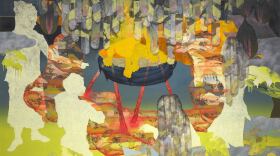Emma Smith never forgot the discomfort of camping out on Duke's campus during a rainstorm, her tent filling with water and mud. Didac Garcia-Grau's freshman year saw two tents lost to wind damage.
And for JT Galla, there was nothing quite like seeing sub-freezing temperatures in the forecast for that night's campout in "Krzyzewskiville."
"I think everybody has a moment where they think to themselves: 'Why am I doing this?'" Galla said. "But I don't think anybody has a moment where they think to themselves: 'I wish that I didn't do this.'"
For decades, the reward was securing a coveted spot inside Cameron Indoor Stadium to cheer Hall of Fame coach Mike Krzyzewski's Blue Devils against hated North Carolina. This Saturday, rivalry renewal and all, it's different. Krzyzewski retired after last season as the winningest coach in the history of college basketball and a five-time NCAA champion.
Yet the annual pop-up community of up to 130 tents and more than 1,500 students remained until this week next to the sign bearing his name. Both Krzyzewskiville and the famed rowdiness in those courtside bleachers are part of Coach K's legacy, one successor Jon Scheyer and the "Cameron Crazies" aim to preserve as one of the sport's most fearsome homecourt advantages.
It's kind of like a bucket-list item that you want to be able to look back on with your kids one day and be like, 'I slept in a tent in K-ville and went to the coolest game in college sports.Emma Smith
"It's kind of like a bucket-list item that you want to be able to look back on with your kids one day and be like, 'I slept in a tent in K-ville and went to the coolest game in college sports,'" said Smith, now a senior who, with Garcia-Grau, were this year's co-head line monitors for Krzyzewskiville.
Duke's 83-year-old arena is a cramped-confines throwback. It holds 9,314 fans in a time of bigger and glitzier venues.
It also was a critical piece to Krzyzewski's 42-year run, with his teams winning 88% of games here — including an Atlantic Coast Conference-record 46-game streak from 1997-2000 — and carrying a sellout streak from November 1990 that recently pushed past 500 games.
A few years into his tenure, student demand for the UNC game led to Krzyzewskiville campouts. And the already-rowdy students gained broader fame in nationally televised games with their body paint, costumes, homemade signs and coordinated jeers. The Crazies sit along an entire sideline teeming with sweat, wit, spite and chaos.
Galla, a senior neuroscience major who first camped out during the 2019-20 season, put it simply: "I leave with my ears ringing every time."
The intensity is there any time the Tar Heels visit from nearby Chapel Hill. And it was particularly true for Krzyzewski's emotional Cameron finale in March that ended with UNC spoiling his sendoff before the Tar Heels won again in the Final Four — the first-ever NCAA Tournament meeting between the rivals — and ended Krzyzewski's career.
It's easy to see how much the Cameron vibe matters for the Blue Devils: The only time Duke lost as many as five home games in 27 seasons came in 2020-21 with no fans due to COVID-19 restrictions.
Jon Scheyer knows it well after a playing career that included being the leading scorer on Krzyzewski's 2010 title winner. The 35-year-old is counting on it as Duke's first-year head coach.
"What I want Duke fans to feel is they're right alongside us in this journey," Scheyer said, adding, "When we're home, we're all scrapping, clawing, fighting together."
Students who camp outside of Cameron in the weeks leading up to the UNC game follow a Krzyzewskiville policy manual checking in at 44 pages.
They could register for one of 70 priority "black" tents representing up to 12 people. If more than 70 registered — Garcia-Grau said this year's number was 140 — tents were awarded based on scores for each group on a trivia test about that year's Blue Devils.
The first groups were allowed to set up tents in early January this year, and other tents followed with lower priority. Groups had to keep a minimum number of people in tents at all times for line checks (other than during grace periods for students to leave, such as inclement weather).
Krzyzewskiville was taken down in recent days after the admission order had been determined for Saturday.
Along the way, students had decorations such as a photo of player Jacob Grandison and the Grand Canyon — dubbed the "Grandison Canyon" — or a mocking photo of UNC center Armando Bacot from last year's Final Four weekend in New Orleans.
Some do homework in a study tent with tables and charging areas for electronics. Some stream movies or TV shows. Others play games or chat with fellow campers.
The smell of alcohol typically lingers — along with the buzz — as groups made their way into Cameron for games. And there has long been the sense of community that can only come passing on a perfectly acceptable dorm room to sleep in a tent on a cot on a chilly night.
It's all part of the experience, one that feels unchanged after Krzyzewski's handoff to Scheyer.
"Our whole lives, people are going to ask, 'Oh did you go to a basketball game? If they know anything about college basketball, they'll ask, 'Oh did you go to the UNC game or did you tent?'" Garcia-Grau said.
"Everyone wants to do it. ... So I think it's like, a crucial part of being a Duke student is being a Cameron Crazie at some point in your career."






